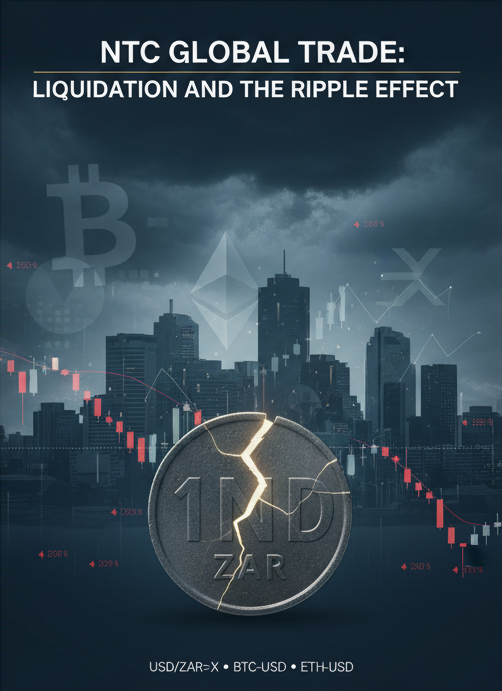NTC Global Trade Liquidation: South Africa’s Crypto Credibility on Trial
NTC Global Trade’s R484m collapse, shadowed by van Niekerk’s murder, sharpens South Africa’s risk premium. With R262m owed and FSCA under scrutiny, investors eye USD/ZAR=X swings, 2030 Eurobond yields at 8.4%, and widening CDS as trust erodes in the country’s crypto oversight and rule-of-law.

The provisional liquidation of NTC Global Trade, a crypto investment firm once under the scrutiny of slain attorney Bouwer van Niekerk, is no longer just another courtroom event. It is a flashpoint that reveals the fragility of investor protection, the gaps in regulatory oversight, and the dangerous intersections of money, law, and crime in South Africa’s digital economy. For investors, regulators, and policymakers alike, the case is a litmus test of whether the country can govern an industry whose very appeal lies in its borderless, opaque, and high-risk nature.
Court filings show that NTC Global Trade drew in roughly R484 million (≈$25m) in capital, leaving about R262 million (≈$13.5m) in liabilities. At least 26 creditors initiated the petition that resulted in the Pretoria High Court granting a provisional liquidation order. By comparison, the Mirror Trading International collapse (unlisted, but often dubbed “South Africa’s FTX”) is estimated to have cost investors R23 billion, making it the largest Ponzi scheme in the country’s history. Africrypt, another 2021 scandal, claimed R54 billion vanished before regulators could intervene. Against this backdrop, NTC’s scale looks smaller, but its concentration of creditors—including high-net-worth individuals—amplifies the risk profile. Promised returns of up to 2,000% mirror the unrealistic multiples seen in global failures like FTX (FTT-USD) and Celsius (CEL-USD).
The liquidation came just days after van Niekerk’s assassination. The attorney had reportedly received death threats linked to his insolvency cases. His murder added a chilling layer: the case now blurs financial misconduct with rule-of-law concerns. For global investors, this intersection has pricing consequences. South Africa already carries a governance discount, reflected in the sovereign risk premium. As of September 2025, the yield on South Africa’s 2030 Eurobond trades around 8.4%, roughly 280 basis points wider than comparable Nigerian sovereign paper and almost double that of Morocco. The spread reflects not only fiscal pressures and load shedding risks but also the erosion of trust in institutional strength. When legal professionals are assassinated in connection with financial cases, the perception of systemic risk deepens.
The Financial Sector Conduct Authority had already issued a caution in 2024 against NTC and its affiliate Arbitra-wallet, warning they might be offering unregistered financial services. Following the unraveling, FSCA has turned to cross-border cooperation, engaging with regulators abroad to trace flows. Yet its reactive posture stands in contrast to global peers. The European Union’s MiCA framework is already rolling out phased requirements for reserve adequacy and disclosure. Mauritius established a licensing regime that requires crypto entities to publish audited statements. Even Nigeria, which briefly imposed a blanket ban in 2021, has since pivoted to a stricter licensing model. South Africa, in comparison, appears to be firefighting rather than legislating. Investors notice. The rand (USD/ZAR=X), which traded near 18.25/$ in early September, has swung violently in recent sessions, a reminder that legal uncertainty adds to currency volatility alongside inflation and rate expectations.
Investor psychology follows a familiar arc. In the short term, panic drives capital to safety: deposits at JSE-listed banks like Standard Bank (SBK.JO), FirstRand (FSR.JO), and Absa (ABG.JO), or into gold (XAU/USD), which remains South Africa’s oldest hedge. Over time, absent reforms, memory decays and fresh schemes emerge with new marketing gloss. Each cycle deepens skepticism toward fintech and crypto ventures. Venture funding into African fintechs, which peaked above $2.3bn in 2021, has already slowed sharply; high-profile collapses like NTC make investors demand higher IRRs, raising the cost of capital for legitimate innovators. Banks, still under FATF greylisting constraints, hesitate to provide on-ramp services for crypto-linked firms, effectively throttling even compliant players.
The FATF greylisting in 2023 was estimated by the IMF to shave 0.3–0.6 percentage points off annual GDP growth by reducing foreign direct investment inflows. South Africa’s FDI fell from $4.6bn in 2022 to $2.7bn in 2023, a decline partly attributed to increased compliance costs and investor caution. Cases like NTC reinforce the very perception of weak enforcement that greylisting sought to highlight. For international lenders, this translates into a higher risk-adjusted return threshold. For example, five-year credit default swaps (CDS) on South Africa widened from 225 basis points pre-greylisting to over 310 basis points in mid-2024, and have not fully retraced.
Market Snapshot (Interactive)
| Asset / Instrument | Level | Move | YTD % |
|---|---|---|---|
USD/ZAR=XFX |
18.25 | ▲0.8% | -6.5% |
XAU/USD (Gold)Commodity |
$2,420/oz | ▲0.4% | +11.2% |
South Africa 2030 Eurobond YieldRates |
8.40% | ▼5 bps | +65 bps |
SA 5Y CDSCredit |
310 bps | ▲15 bps | +85 bps |
Standard Bank (SBK.JO)Equity |
R191.20 | ▼0.7% | -3.2% |
FirstRand (FSR.JO)Equity |
R66.40 | ▼0.5% | -1.8% |
Absa (ABG.JO)Equity |
R172.80 | ▼0.6% | -2.5% |
Bitcoin (BTC-USD)Crypto |
$63,500 | ▲1.1% | +45.0% |
Ethereum (ETH-USD)Crypto |
$2,850 | ▲0.6% | +29.0% |
Three scenarios for NTC are plausible. In the best case, substantial assets are recovered, creditors receive partial restitution, and FSCA leverages the case to accelerate crypto regulation, integrating proof-of-reserves audits and clear licensing. This would improve South Africa’s FATF remediation narrative and narrow sovereign spreads. In the middle case, recoveries are modest, enforcement remains patchy, and skepticism lingers, leaving the country vulnerable to another cycle of fraud. In the worst case, asset tracing fails, van Niekerk’s murder remains unsolved, and regulatory credibility erodes further. Under that scenario, investors will demand an even steeper premium for holding South African risk, widening the ZAR’s volatility bands and pushing fintech investment flows offshore to hubs like Nairobi, Lagos, and Port Louis.
Breaking this cycle requires decisiveness. Establishing a dedicated Digital Assets Regulatory Unit within the FSCA could centralize oversight. Mandatory proof-of-reserves, akin to Basel III liquidity coverage ratios, would lift transparency. Cross-border tracing agreements with Dubai, Mauritius, and the EU would enhance restitution prospects. Security protections for insolvency practitioners would safeguard the legal process itself. Integrating crypto enforcement outcomes into FATF progress reports would demonstrate seriousness to global investors.
The NTC Global Trade liquidation is about more than R484 million in vanished funds. It is about South Africa’s credibility as a financial jurisdiction. In a country where nearly 40% of the population remains financially excluded and where the rand (USD/ZAR=X) trades with chronic volatility, the allure of digital assets will not fade. But without decisive regulation, enforcement, and institutional safeguards, the cycle of fraud, loss, and distrust will persist. The outcome of NTC’s liquidation will tell investors whether South Africa is capable of restoring trust in its digital frontier, or whether law, finance, and crime remain dangerously entangled.





